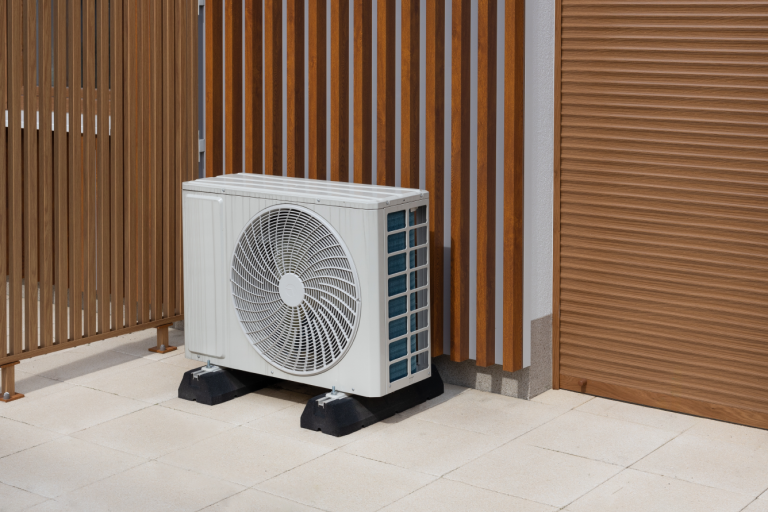Air source heat pumps
Air source heat pumps are the most common type of heat pump used in homes. They are powered by electricity to generate heat rather than cooling. Heat pumps typically achieve an efficiency rating of 300% – this means for every unit of electricity they consume, they will produce 3 units of heat.
In comparison, a new condensing gas boiler would achieve an efficiency of 90%. Unlike combi-boilers, heat pumps do not provide hot water instantly, so you will need to use a hot water cylinder.
A common concern is the noise the pumps make. The noise level depends on how hard the pump is working, which can increase in colder weather. In the UK, the legal noise limit for heat pumps is 42 decibels. Position the heat pumps in the home, so that they do not disturb your neighbours with noise or vibrations.
While heat pumps are expensive to install, you may be eligible for a grant under the UK government’s Boiler Upgrade Scheme to help with the costs, if your home is energy efficient enough.
The Energy Saving Trust provides a guide on air source heat pumps detailing their benefits, installation costs and savings on your energy bills.
The Planning Portal has all the planning permission information you require for air source heat pumps.
Risks
If your home is not well-insulated, installing a heat pump may increase your energy bills instead. This is because electricity is more expensive than gas.
Other things to consider include ensuring your heat pump is running as efficiently as possible.
Also, it is important to prioritise insulation measures to improve the thermal performance of your home.
Regulatory considerations
- Installation of an air source heat pump is permitted development.
- Planning permission and listed building consent is required for listed buildings.
The relevant building regulations which are required include:
The relevant building regulations requirements are the same for ground source heat pumps.
Cost: £10,000 or more

Ground source heat pumps
Ground source heat pumps extract heat from the ground outside your home to heat water for radiators and underfloor heating.
If you are thinking of installing one, you will need outside space for trenches or boreholes (deep holes in the ground). You will also need enough room inside your home for a heat unit.
Installation is expensive because of the extensive groundwork required, especially for horizontal trenches. They are usually used for larger rural properties or groups of buildings. Speak to a professional installer for advice.
The Energy Saving Trust provide a comprehensive guide to ground source pumps detailing how they work, benefits and how much they cost.
The Planning Portal has all the planning permission information you require for ground source heat pumps.
The Centre for Sustainable Energy has advice on heat pumps.
Regulatory considerations
- installing a ground source heat pump is typically considered permitted development for properties.
- open loop systems require Environment Agency approval.
- listed building consent is needed for listed buildings.
Cost: More than £10,000
Disruption: High
